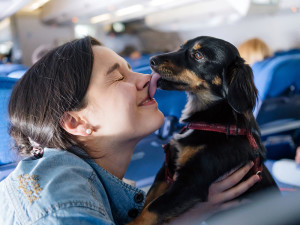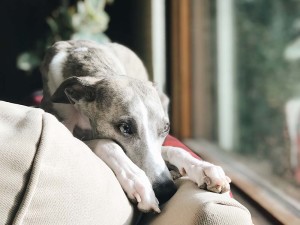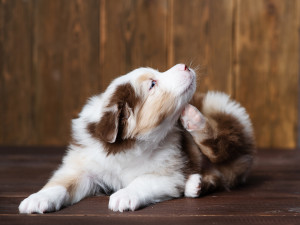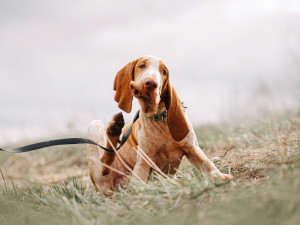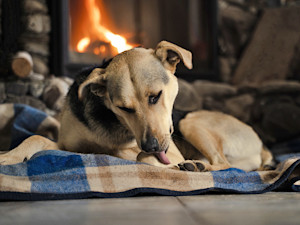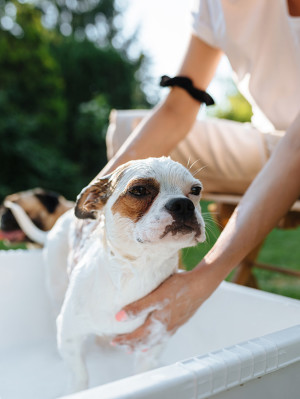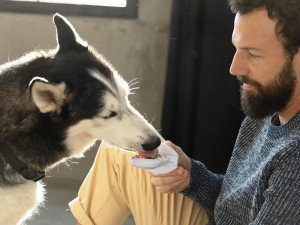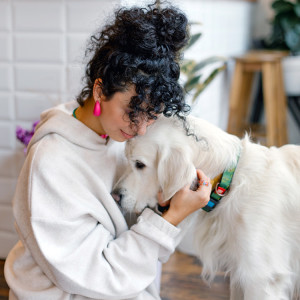Why Do Dogs Lick Themselves?
They especially love to do this when they’re ignoring you.
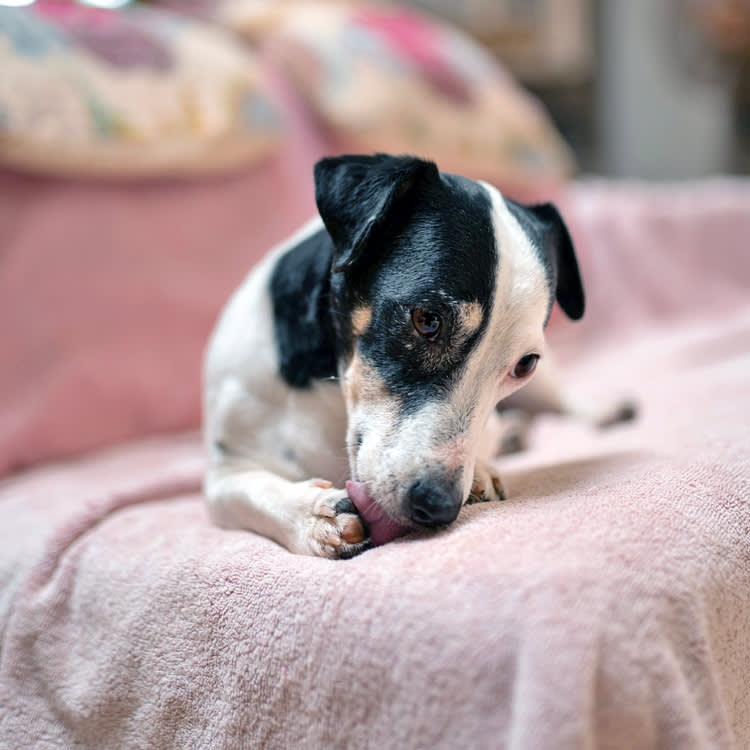
Share Article
In This Article:
Common Reasons Dogs Lick Themselves Behavioral Reasons for Self-Licking Licking as a Health Indicator Is Excessive Licking Normal? How to Stop Excessive Licking When to Visit the Vet for Excessive Licking
Raise your hand if you’ve ever laid down for a night of blissful sleep, only to immediately hear your dog slurp, slurp, slurping at the other end of the bed. You give them a light nudge to subtly beg them to stop licking, but nonetheless, the behavior continues. So why do our lovely canine companions engage in this repetitive behavior? Surely it isn’t just to annoy us.
Dogs lick themselves for a variety of reasons. For one, it’s a natural grooming behavior, which helps to keep their fur clean and free of debris. It can also be soothing for dogs and provides comfort or stress relief. These are normal and common behaviors; however, if the licking becomes excessive or occurs out of the blue, it could be a sign that something is going on.
Learn why dogs lick themselves, how you can stop it, and when it’s time to take them to the vet for treatment.

Common reasons why dogs lick themselves
Licking is a natural behavior that the majority of dogs engage in to clean or soothe themselves. Remember, they can’t draw their own bath or just hop in the shower whenever they want to, so if they notice some crusties on their paws, they resort to repetetive licking. They may also lick themselves because they simply don’t have anything else to do.
“It is normal for dogs to lick themselves up to a certain point,” says Dr. Ray Spragley, founder and veterinarian at Zen Dog Veterinary Careopens in new tab. “Dogs without an issue may lick to clean themselves or out of boredom. If they are fixated on licking a certain area and will not stop, there is likely an issue going on.”
Whether the issue is behavioral or medical, it’s important to get to the bottom of it so your dog doesn’t do any damage to their skin or cause an infection. And as a bonus, maybe you’ll be able to get a good night’s sleep again.
Behavioral reasons for excessive licking
Excessive licking in dogs isn’t always a sign of a medical issue; sometimes, it stems from behavioral reasons. Here are some common behavioral causes of repetitive licking:
Boredom: Dogs may resort to excessive licking when they’re understimulated or lacking in mental and physical activities.
Grooming: Dogs instinctively groom themselves, but excessive licking can indicate an overzealous grooming habit, possibly due to discomfort or stress.
Anxiety: Similar to humans, dogs may lick excessively as a coping mechanism for anxiety or stress. It can be a self-soothing behavior.
Hunger: If a dog is hungry or not getting enough food, they may lick excessively, possibly as an attempt to find leftover food or as a way to signal their hunger.
Attention seeking: Dogs are social animals and may resort to excessive licking to gain attention from their pet parents or other pets, especially if they’ve learned that licking gets them the desired response (aka, your nightly nudging routine may be reinforcing the habit).
Medical reasons for excessive licking
While licking can be normal, there are some medical reasons that can lead to excessive licking, with some being more serious than others. Allergies are a common culprit, but there are a slew of other conditions that can lead to this peculiar behavior, whether they’re licking their paws, lips, or genitals.
“The most common reason for a dog to lick excessively is allergies,” Dr. Spragley says. “Dogs may also lick a specific area due to pain at that spot, parasites, infections, nausea, or dry skin.”
Here’s a quick breakdown of some common medical issues that cause excessive licking:
Allergies: Dogs can develop allergies to various environmental triggers, such as pollen, dust mites, or certain foods. Excessive licking may be a response to itching or irritation caused by allergies.
Injury: If a dog is injured, especially in an area they can reach with their tongue, they may lick the wound excessively as a way to clean it or alleviate pain.
Parasites: Infestations of parasites such as fleas or ticks can cause intense itching, prompting a dog to lick excessively in an attempt to relieve discomfort.
Infection: Skin infections, ear infections, or other types of infections can lead to irritation and itching, resulting in excessive licking to soothe the affected area.
Nausea: Dogs may lick excessively when feeling nauseous or experiencing gastrointestinal upset. This behavior can be a form of self-soothing or an attempt to alleviate discomfort.
Dry skin: Dry skin, whether due to environmental factors or underlying health issues, can cause itching and discomfort, prompting a dog to lick excessively to relieve the itchiness.
It’s important to note that if your dog excessively licks surfaces, this is an actual medical condition called excessive licking of surfaces opens in new tab(ELS). Experts believe that dogs with ELS likely have an underlying GI issue or obsessive compulsive disorder (OCD). So, if you notice your dog licking both themselves and surfaces such as floors, walls, carpet, and other objects, it’s definitely worth a chat with your pup’s veterinarian.
Is it normal for a dog to lick themselves a lot?
It’s perfectly normal for dogs to lick themselves occasionally as part of their grooming routine or to soothe minor irritations. However, if you notice your dog licking excessively, especially if it’s a change in behavior or becomes a chronic habit, it’s important to pay attention, because it could indicate an underlying problem that needs to be addressed. The reality is that “normal” can look different for each dog, but generally, sudden onset or long-term excessive licking likely signals an issue.
How to stop your dog from excessive licking
If you’re not noticing any signs of a serious medical or behavioral condition, you may want to try some home remedies for dog licking. Dr. Spragley suggests redirecting their attention by giving them something they like or playing with them. If they tend to lick out of boredom, giving them a mentally stimulating toy can also help. Here’s a round-up of home remedies for excessive dog licking you can try:
Increase exercise and activity: Provide regular exercise and mental stimulation to prevent boredom and anxiety.
Consider their diet: Make sure your dog’s diet is balanced and meets their nutritional needs to address any dietary deficiencies that may contribute to licking behavior.
Keep it clean: Keep your dog’s environment clean and free of potential irritants or allergens that could trigger excessive licking, such as harsh cleaning products or synthetic fabrics.
Discourage the behavior: Use bitter-tasting deterrent sprays on areas your dog tends to lick excessively to discourage the behavior.
Practice positive reinforcement: Positive reinforcement training techniques can help redirect your dog’s licking behavior towards more appropriate activities.
Elizabethan collar (cone): In cases of excessive licking, it may be necessary to put on an Elizabethan collar while you wait for a veterinarian to assess the situation.
When should I take my dog to the vet for excessive licking?
At a certain point, the licking will likely become unbearable for both you and your dog. The sound is driving you nuts and your dog’s skin is getting red and irritated, and not stopping the behavior could lead to even worse issues such as infections or lick granulomas.
“You should take your dog to the vet if they are becoming fixated on licking a certain area,” Dr. Spragley explains. “By licking an area, they are introducing bacteria to that spot as well as traumatizing the skin in that area. Without treatment, they will almost always cause themselves an infection if it continues.”
Dr. Spragley says that if you notice an odor or redness, to bring them to the vet immediately. If they are licking the air, objects, or the environment excessively, you should also bring them to the vet to determine the cause.
FAQs (People also ask):
Why do dogs lick their privates?
Dogs lick their privates as a part of their grooming routine. However, they may also engage in this behavior to alleviate itching or discomfort caused by irritation, allergies, or even infections. If you notice excessive licking in this area accompanied by signs of pain or inflammation, it’s essential to consult with a veterinarian to rule out any underlying medical issues.
Why do dogs lick their lips?
Dogs lick their lips for various reasons, such as to alleviate anxiety or stress, as a signal of submission, or in anticipation of food. It can also be a reflexive response to something delicious or a way to gather more information about their environment through scent. Lip-licking can also be a response to physical discomfort, such as nausea or digestive upset.
Are lick mats good for excessive licking in dogs?
Yes, lick mats can be beneficial for dogs who engage in excessive licking behavior. These mats provide a distraction and can help soothe anxiety or stress. By spreading a tasty treat or food paste on the mat, you can engage your dog’s senses and encourage them to focus on a positive activity rather than excessive licking. However, it’s essential to supervise your dog while using a lick mat to ensure they don't ingest too much food or the mat itself.
References:
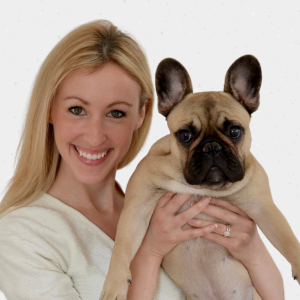
Courtney Elliott
Courtney Elliott, a proud Cleveland native living in Manhattan, blends her decade of writing and editing expertise with her unshakable devotion as a pet parent to her French Bulldog, Gus. When she’s not at her desk, you’ll find her frolicking in Central Park or engrossed in a good book at a local coffee shop.
Related articles
![puppy scratching fleas, get rid of fleas on dogs]()
How to Get Rid of Fleas — Proven Home Remedies
You can stop your home from becoming a literal flea circus.
![Dog licking its paw inside by the fire.]()
Hot Spots in Dogs: What Are They, How to Treat Them, and How They Compare to Ringworm
From home treatments to holistic methods—and when to call a vet.
![Little dog getting showered by his owner in the backyard.]()
How to Treat Dog Skin Diseases at Home
And how you might safely give your pup immediate relief.
Why Does My Dog Keep Licking Their Lips?
It’s not always just because they want whatever you’re eating.
![A bearded man in a gray sweater and yellow pants sitting on the floor and holding a Groov Training Aid in "lilac" from Diggs Pet, which is like a grooved plastic popsicle with treats smeared in, while his Husky dog licks it]()
9 Stress Toys For Dogs That Are Cheaper Than Therapy
The toys that’ll help your pup chill out after a long day of being a dog.
![woman comforts her dog]()
What Medication Can You Give Your Dog for Anxiety?
Here are some options your vet can help you consider.


